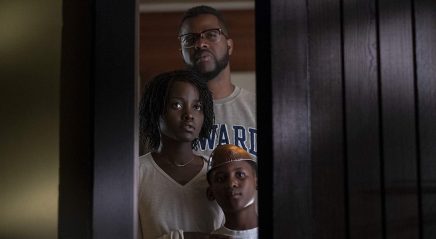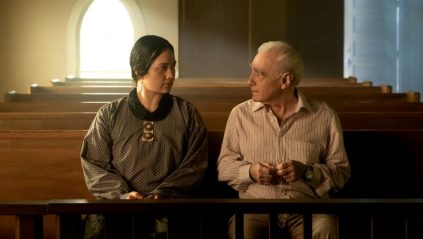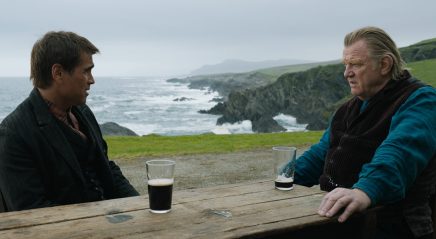I was 4 years old when I saw my first horror movie. My parents loved to go to the movies, and this was the 1980s, when Freddie Kreuger, Michael Myers and Jason Voorhees dominated theaters. I don’t know quite how it happened, but my parents decided to take me to a midnight showing of the 1989 horror adaptation of The Phantom of the Opera, starring Robert Englund as the titular character. They assumed I would sleep through the film. I didn’t.
I was at once enthralled by the over-the-top camp and melodrama of the film (both staples of 1980s horror) and disgusted and fascinated by its body-horror scenes, with all the practical effects that a small budget could produce. A lifelong horror fan was born that night.
When I rewatched the movie recently, I was struck by how many scenes I remembered. At one point a character asks the Phantom, “What is your desire tonight?” to which he responds, “Desire! What do you know of desire?” What indeed, I mused, immediately thinking of what Martin Luther called “the happy exchange” that occurs in baptism, wherein Christ is knit to the believer’s heart through faith. In this mystical aspect of Lutheran theology, God in Christ’s desire for connection to humanity is so deep that it knows no bounds, with Christ knitting himself to our very beings.
In retrospect it seems almost inevitable that I would blend these two passions—a love of horror and a love of Luther.
As a Luther scholar, I am saturated in theologies of captivity to sin and the freedom of grace. In retrospect it seems almost inevitable that I would blend these two passions—a love of horror and a love of Luther—not just in my dissertation work but on Horror Nerds at Church, the weekly podcast I co-host with pastor and fellow ELCA seminary alum Emily E. Ewing. Each week we look at horror films and discuss how they connect to queerness, religion and theology.
Horror is fascinating to me, not just as a genre but also as spectacle and experience. And given my work and perspective, I can’t help but notice the ways Luther’s life and writing regularly confronted horrors.
Luther wrote frequently of his anfechtung, meaning tribulation or temptation—periods of his life when he felt under trial from Satan himself. Many scholars have since suggested that these were periods of deep depression for Luther. He was also in constant danger, living in protective custody following his excommunication. He wrote of the horrors of sin that corrupt human nature, separating us from God. And his own legacy is one spotted with the horrors of the Holocaust, as Nazi Germany’s propaganda machine would use Luther’s antisemitic writings to support genocide of the Jewish people.
Baptized in horror
In many ways horror is a religious genre. Few genres grapple so heavily with themes of good versus evil, considering its regular subject matter of demons and spirits, monsters that lurk in shadows, and even the horrors of religion itself, in films like Midsommar (2019) and Red State (2011), to cite two relatively recent examples. Horror and religion are inextricably linked. But there’s also something about being a horror spectator that’s akin to a religious experience.
Last year, on my podcast, I interviewed several horror authors about how they define the genre. Lee Murray, the Bram Stoker Award-winning editor of Remains to Be Told: Dark Tales of Aotearoa (Horizon, 2023), said of horror, “It’s transgressive, it’s subversive, it’s inclusive, it is effective. It is all of those things.” Ben Monroe, author of The Seething (Brigids Gate Press, 2023), said that horror is unique because it is the “only genre named after an emotion.”
Horror is effective, but also it is affective—perhaps more than any genre.
Horror is effective, but also it is affective—perhaps more than any genre. It chills us to the bone, it gives us nightmares, it stays with us long after we encounter it. Horror can teach us about the realities of the world, the way Get Out (2017) examines racism. It can inspire us to be different. It allows us a safe space to examine the things we want to keep hidden, the sources of our anxieties, fears and, yes, our desires.
In Luther’s articulation of the “happy exchange,” something at the very core of our being shifts at baptism—what theologians and philosophers call an ontological shift. In the moment of faith, the spirit unites us. That shift challenges us to change the world, to be subversive reformers in the footsteps of Luther himself. We are different people before and after the moment of the happy exchange, a journey that lasts throughout our lives and is completed only in the kingdom to come.
That movie theater experience I had in 1989 was something of a religious experience for me. I was baptized into horror stories and left the theater a different person. Horror can shape us, mold us, change us. And, if we let it, it can also teach us about God, ourselves and each other.









